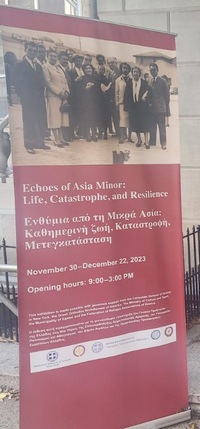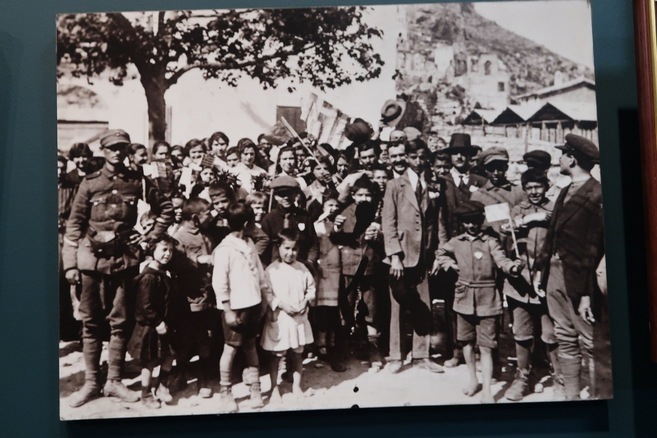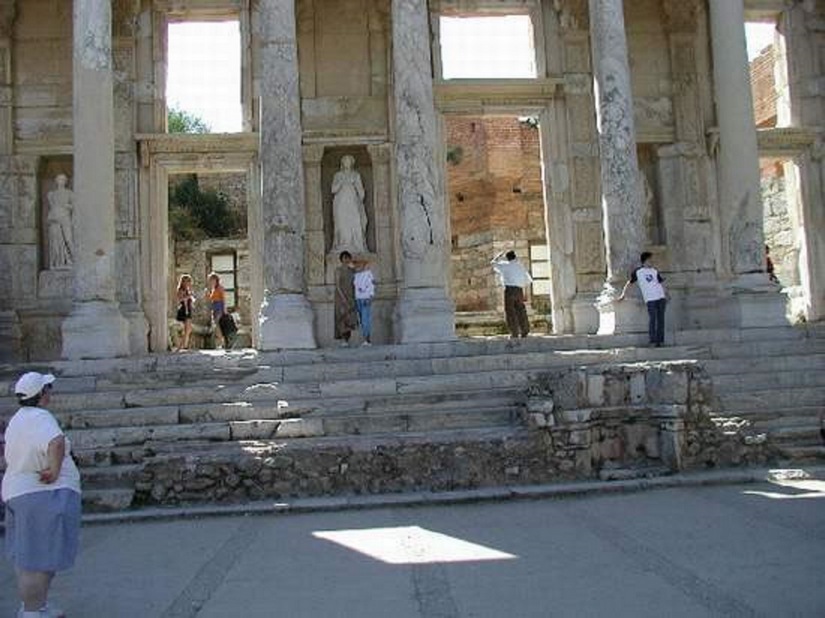
The exhibition ‘Echoes of Asia Minor: Life, Catastrophe and Resilience’ opened on Tuesday, November 29th, at the NYC Greek Consulate at 69 E 79th St. The Greek Orthodox Archdiocese, with President Giannis Koutoulias of the Asia Minor Association of Egaleo “Nees Kydonies” & the Museum of Asia Minor Culture of Egaleo collaborated on this event.
“Many New Yorkers are descended from Asia Minor refugees,” said Consul General of Greece in New York, Konstantinos Konstantinou at a Tuesday, November 28th interview on Dimitri Filippides HellasFM program. “Americans must learn about their history: the uprooting of Greek civilization in Asia Minor, their coming to continental Greece and immigration to the USA. For 15 months I have been dreaming of this amazing exhibition about the Asia Minor Catastrophe that was shown in the Athens Benaki Museum. I am happy to make this project a reality.”

Greek welcome of army, Ephesus, Turkey– courtesy of War Museum, Tripolis, Greece
“We encourage schools and groups to come .” said Consular General Konstantinou. “The purpose of the exhibit is for youth to see and learn.” 2023 is the 100th anniversary of the Treaty of Lausanne that resulted in the population exchange of Greeks from their ancestral homeland in Asia Minor to Greece and immigration overseas to America. The Asia Minor refugees came during the first wave of immigration from 1900-1924. America opened its doors to the persecuted Christians of Western Anatolia.
President Koutoulias added “The Asia Minor Catastrophe is never covered in history books. 11/2 million Greeks from Asia Minor came to Greece. Their immigration changed the face of Greece. They were not welcomed and persecuted in many ways. They struggled in Greece with Greeks.”
“We are all Mikrasiates (Greeks of Asia Minor), explained journalist/radio anchor Dimitri Filippidis on his program. “We have friends and neighbors from Asia Minor. They are part of our Greek society.”
“What do Homer, Herodotus, Thales, Strabo, and Diogenes have in common? They all were born, not in what is now modern Greece, but rather in Asia Minor. The ancient Greeks of Asia Minor were crucial to the development of Western poetry, prose, history, medicine, philosophy, and science. Indeed, they were the first great thinkers of antiquity. Yet, many teachers do not convey to their students the remarkable Hellenic presence in Asia Minor and the magnificent contributions these Greeks made to the world. Nor do they tell of the horrible ending to the Greek presence in Asia Minor, through a decade of genocide that may have claimed as many as one million Greek lives”1
Why was Asia Minor, known in history as Ionia important in Ancient Greece? The HistoryDisclosure online page explains that “Ionia was a region in ancient Greece that played a significant role in the development of Greek culture and civilization. The Ionians were one of the four main tribes that inhabited Greece, and their influence can still be felt today in modern Western culture. It was an area rich in natural resources, including fertile soil, abundant timber, and valuable minerals. The region was also strategically located on the eastern edge of the Aegean Sea, making it an important center for trade and commerce.

View of Stadium, Ephesus, Turkey.
Ionia was also home to some of the most famous philosophers in ancient Greece. Thales, Anaximander, and Anaximenes were all from Miletus, a city located in Ionia. These philosophers were known for their contributions to early Greek science and philosophy. Ionia was also home to some of the most beautiful examples of ancient Greek art and architecture. The Temple of Artemis at Ephesus was one of the Seven Wonders of the Ancient World and remains an impressive example of ancient Greek architecture to this day.

Library of Celsus, Ephesus, Turkey
The city-state of Athens is often credited with being the birthplace of democracy. However, many scholars argue that Ionia actually played a crucial role in the development of democratic ideals. The Ionian city-states were known for their democratic governments and were a model for other Greek city-states to follow. Ionia’s democratic ideals influenced the development of democracy in other Greek city-states. Overall, Ionia played a significant role in shaping the course of Western civilization as we know it today.”2
”The beauty of Smyrna was not the houses or streets. The beauty of Smyrna was us, the Greeks, the Romans, the Smyrneoi…. The beauty of the Greeks was not the locations or the marbles. It was the bravery (Leventia) they had in their souls,” said author Angela Papazoglou. Visit the NYC Greek Consulate exhibition to relive our roots.

Reverence:
- https://nationalhellenicmuseum.org/greeks-asia-minor/
- https://historydisclosure.com/why-was-ionia-important-in-ancient-greece/
- Links
- https://www.qgazette.com/articles/the-lost-hellenic-tseme-province-communities/
- https://nomadicjoe.blogspot.com/2010/10/izimir-revisited-by-descendent-of-asia.html
- https://greekamericanexperience.wordpress.com/2020/02/27/ninety-years-after-the-first-expulsion-of-greeks-from-tseme/
- https://greekreporter.com/2014/09/28/why-should-we-remember-the-asia-minor-catastrophe/
Photos: